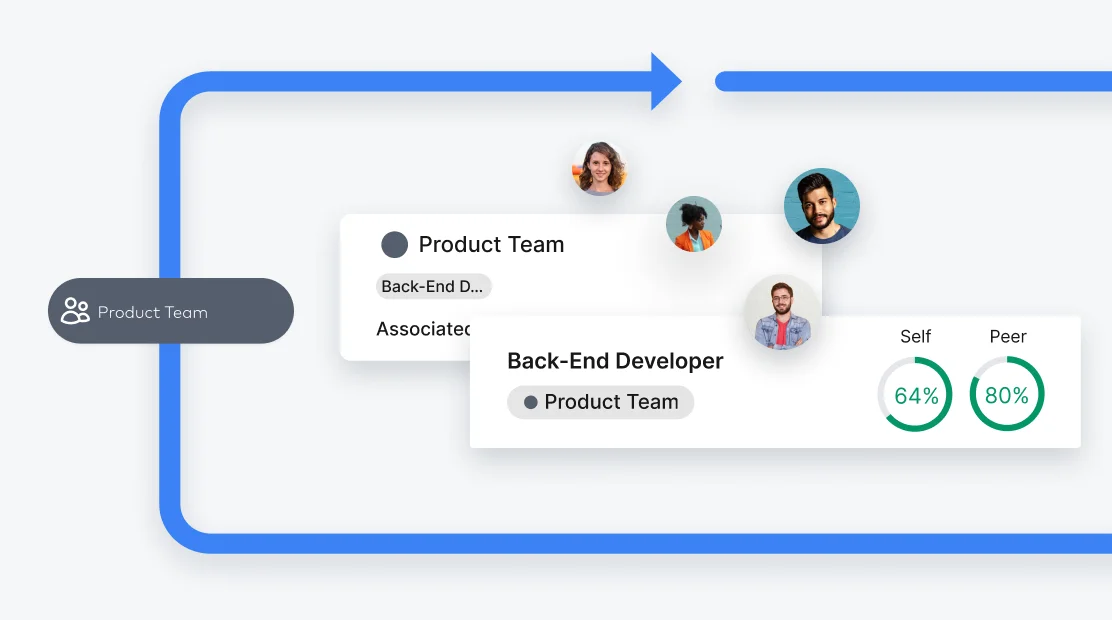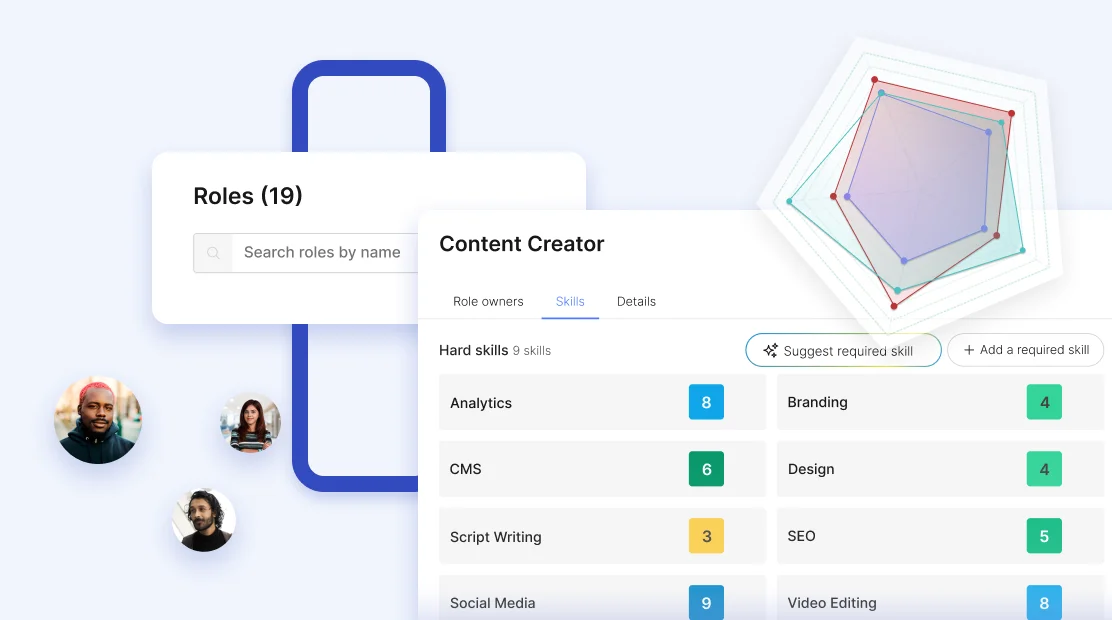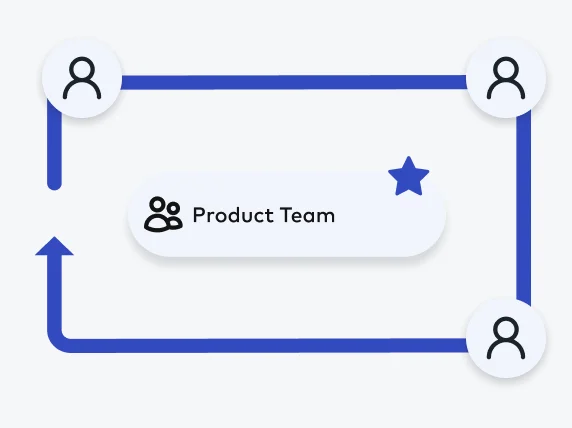Skills Management Software: Revolutionize Your Employee Management!
Elevate your organizational development with our all-in-one Skills Management Software!
Analyze skill gaps, track employee performance, and boost efficiency with our powerful skills management tool.
Efficient Competency Mapping with a Skills Matrix!
Strategically align talent, track growth, and optimize employee skills at a glance. Map competencies to specific roles and discover improvable aspects to boost talent allocation and upskilling.

AI-Driven Skills Gap Analysis to Pinpoint Improvable Aspects!
Using our integrated AI-powered skills gap analysis tool, you can identify the missing talents and choose the best candidates for specific roles based on individual qualifications.
Exploit intelligent, real-time data to strategically align training initiatives with organizational goals to future-proof your company.

Performance Reviews For A Thorough Employee Evaluation!
Conduct extensive 360-degree feedback sessions through our employee performance reviews tool, providing actionable insights for organizational growth.
Automate review processes, whether anonymous or public, to foster a culture of continuous learning and improvement.

Visualize your Org Structure with Interactive Org Charts!
Effortlessly visualize your organizational structure.
Easily track roles, responsibilities, and team structures through radar charts and graphs to foster seamless collaboration and quick decision-making.

Competency Management for Effectively Developing and Aligning Roles!
Manage and develop competencies for every role across your organization.
Align skill sets with organizational goals and future needs to ensure your team is always ready for new challenges.

Gain Actionable Feedback From Employee Surveys!
Seamlessly combined with skills management, our employee survey system allows you to gather insights into employee satisfaction and workplace culture.
Collect anonymous or public feedback from surveys to foster collaboration, motivation, and productivity.

The Kudo Wall’s Tangible Recognition and Appreciation!
The Kudo Wall function allows you and your employees to publicly share recognition and appreciation, fostering a more positive workplace culture.
Celebrating achievements and boosting morale can take engagement and productivity within your organization to the next level!

Build and visualize a skills-based organization with a collaborative culture
Skills Management is Suitable For:

Optimized Hiring

Match candidates with the required skills quickly and efficiently through competency management to optimize recruitment and improve the quality of talent acquisition.
Streamlined Performance Tracking

Integrating performance reviews with skills management makes it easier to track growth and identify top talent or areas for improvement.
Data-Driven Talent Development

Use skills gap analysis to design targeted training programs to promote continuous employee development that aligns with business goals.

Effective Team Building

Effortlessly assess team skills and competencies to assemble high-performing teams and enhance project success rates.
Real-Time Performance Insights

Track employee performance and monitor progress with detailed and real-time analytics.
Goal-Oriented Planning

Strategically manage resources by aligning employee skills with organizational needs through AI-driven insights to ensure productivity and engagement.

Comprehensive Client Assessment

Offer AI-driven skills gap analysis and competency evaluation for clients to help them streamline their employee strategies.
Personalized Development Solutions

Design customized learning and development plans for clients based on their employees’ skills and organizational goals.
Benchmark Organizational Success

Provide clients with benchmarks to measure their team’s performance and set goals based on organizational objectives for improvement and competitive advantage.
The Skills Management Platform’s Benefits:
Enhance Your Recruitment Process!
Our skills assessment tool helps you improve recruitment strategies with precise skills matching, reducing time-to-hire and increasing the chances of finding the perfect fit for each role.
Unlock New Opportunities!
With our integrated performance reviews tool, you can discover new talents within your organization and enhance upskilling and reskilling. Gain insights into your team’s strengths and areas for growth, facilitate strategic development based on individual skills, and develop your team's topology.
Customized Data Analysis and Goal Setting!
Exploit our all-in-one yet customizable skills tracking software for surveys, gap analysis, and performance reviews to set precise skill goals for each role and gain a clear roadmap for personal and professional growth.
AI-Driven Insights into Performance and Competencies!
Harness advanced AI analytics to effectively search and visualize skill distribution across your entire organization, unlocking valuable insights for skills-based development and growth.
Build and visualize a skills-based organization with a collaborative culture
How agyleOS empowers your organization
Drive Employee Development
Build and visualize a skills-based organization with a collaborative culture


How does the agyleOS skill management software work?
The agyleOS skill management software is designed to help you streamline and enhance organizational skills management.
Key features of our skill management tool include:
- Skills and Experience Input:
Users can input their skills and experiences strategically aligned with specific roles within the organization to outline their business overview for future planning.
- Real-Time Skills Visualization:
The agyleOS platform offers real-time visualization of skills, allowing users to set and track their skill development goals effectively.
- Collaborative Learning Environment:
By promoting data-driven decision-making processes, agyleOS fosters a collaborative learning environment and promotes continuous improvement through integrated feedback loops.
- Strategic Objectives:
As an AI-powered platform, agyleOS aims to create an interactive and adaptive skill management system that enhances organizational agility and strategic alignment.
Why should organizations use skills management platforms?
Skills tracking tools and integral skills matrix software are crucial for organizations aiming to strategically align their workforce with business goals, optimize talent management, and adapt efficiently to changes.
Skills-based organizations seeking a more hands-on approach to employee management can benefit from a skills management platform through:
- Enhanced agility:
Through a scalable and skills-based solution like agyleOS, you can manage employees, skills, and competencies in various situations, industries, and company sizes.
- Facilitated informed decision-making:
Through AI-driven insights into employee performance, role alignment, and gap analysis, you can make quicker and more efficient decisions regarding your company’s future.
- Competitive Advantage:
Through anonymous and public employee surveys, 360-degree feedback, and the kudo wall, you can enhance employee experience within your organization and foster a positive culture to increase engagement and retention.
- Employee Development and Retention:
As an AI-powered platform, agyleOS aims to create an interactive and adaptive skill management system that enhances organizational agility and strategic alignment.
- Navigating Dynamic Business Landscapes:
The agyleOS platform seamlessly integrates with skills matrices and org charts to visualize your company’s structure, each employee’s position, and overall status, resulting in enhanced decision-making and perfect role assignment.
How Can agyleOS Help Your Organization?
agyleOS’ skills management software offers modern and cutting-edge features to help you distinguish your organization from the competition.
In the following, there are some of our most renowned features that contribute to delivering optimal results:
- A User-Friendly Interface:
agyleOS is highly celebrated for its intuitive interface and easy navigation for both administrators and users.
As a straightforward platform that enhances user experience, agyleOS effortlessly boosts engagement in the skills management process.
- Comprehensive Skills Management:
Through AI-driven insights into employee performance, role alignment, and gap analysis, you can make quicker and more efficient decisions regarding your company’s future.
- Highly Customizable:
The tool provides extensive customization options to tailor skills management to suit your organization’s unique needs and objectives.
This feature allows companies with different competencies, skills, and performance metrics to exploit various modules as needed.
- Seamless Integration:
agyleOS’ skills management tool is integrated with a skills matrix or interactive org charts, facilitating data visualization and informed decision-making.
- Skills and Roles Alignment:
As an AI-powered skills management platform, agyleOS helps you align individuals and positions with organizational needs to build a comprehensive skills database for development planning and future-proofing your company.
- Scalability
agyleOS is highly scalable, making it suitable for organizations of all sizes.
Regardless of the company size and industry, a scalable tool ensures adaptability, agility, and continuity.
- Skill Heat Maps:
This feature provides visual feedback data in your personalized org chart, enabling quick and informed decision-making.
- Continuous Learning:
Regular skills assessments, monitoring progress, and encouraging your team through the Kudo Wall will foster a healthy work culture focused on learning and development.
- Modular platform
- Implementation & Onboarding
- Automated Data Sync & SSO
- Expert customer assistance
- Modular platform
- Implementation & Onboarding
- Automated Data Sync & SSO
- Expert customer assistance
- Product
- Resources
- Compare
- Company











